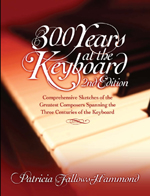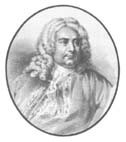Composer Example: Handel
We have produced a 312 page book that covers 17 of the greatest classical keyboard composers in history. For each composer we give a historical sketch of the composer, commentary on their style, commentary on their more important works and sample sheet music they have produced. We follow this with a comprehensive list of all their works so if you like what a composer is like you can instantly go order some or all of their sheet music.
In this discussion, we will give you a sample of the presentation we do for each composer.
George Frideric Handel
Born in Halle, Germany,
February 23, 1685
Died in London,
April 14, 1759,
Age 74 years
Historical Sketch
Of all the great
composers, Handel is one of the very few to come from a family devoid of
musical background. Handel’s father, a barber and minor surgeon, hoped his
son would become a lawyer. His parents consented to Handel’s lessons with
the organist Zachau only upon the insistence of a royal patron, the Duke of
Saxe- Weissenfels. Some years later, as a consequence of Handel’s visit to
the Court of Berlin, the Elector invited Handel to remain as court musician.
But Handel preferred to stay near his ailing father in Halle and took the
position of church organist there.
Seven years after his father’s death in 1696, having completed the study of law, Handel set out for the commercial and cultural city of Hamburg. He then attached himself to the Hamburg opera as violinist and harpsichordist and two years later in 1705 produced his first opera, Almira.
With good fortune rare in the music world, this opera brought him immediate fame. Feted by the musicians Corelli, the Scarlattis, and others, Handel spent several years in Italy from 1706-1710, notably in Florence and Rome. He rapidly mastered the Italian style in opera, chamber music, and vocal music. At the end of this period, he travelled to England where he was warmly received.Except for an occasional return to Germany, Handel spent the rest of his life in England. He was granted a substantial annual pension, first by Queen Anne in 1713, and after her death by George I.2 A few years later, Handel began his most important keyboard works, the Suites
for harpsichord. They were written in part as lessons for the royal Princesses but were also extremely successful with the public.
Saul and Israel in Egypt were both produced in 1739, followed by L’Allegro, il Penseroso et il Moderato in 1740.3 In 1742, Handel wrote in 23 days the most popular of all his Oratorios, the Messiah. The first performance took place in Dublin during the same year. Annual performances became a tradition which Handel……
Style
The vocal polyphonic era of the 16th Century, the Golden Age of polyphony,
produced works dependent on single melodic lines in combination with other
lines. These combinations in turn suggested the richer sonorities which were
the beginnings of harmony. Handel, well-versed in polyphony, embraced the
new sounds. With innate harmonic feeling, he created masterpieces of choral
writing in the Operas and Oratorios. In choral writing, even more than instrumental, he reached a full expression
of his genius. By temperament he was a composer of the theatre who
understood the expressive possibilities of vocal sound.
Where Handel’s vocal and instrumental means were tonally varied, unexpected,
and dramatic, his keyboard resources were simpler by contrast. He introduced
no complexity for its own sake and often wrote interchangeably for organ or
harpsichord, as in the Concertos. However, in the Suites for harpsichord, Handel caught the lively spirit of the dance forms of the
day and wrote idiomatically for the harpsichord with its quick repetitions
and rapid scale passages. With strong melodic feeling and polyphonic skill……
Handel’s most important keyboard compositions are the two volumes of Suites
(also called Lessons) published in 1720 and 1733 respectively, and the
Chaconne with 62 Variations in G published in 1732. Each volume has
8 Suites, A third collection is made up of Six Fugues, 1735. The
Suites do not generally have the cohesion or musical depth of Bach’s
French and English Suites and Partitas, Almost all contain good individual movements, however, some of them
outstanding. Paul Henry Lang suggests that their somewhat sparse and austere writing came from Handel’s
habit of improvising in public performance, using the written music only as
a sketch. Of the three volumes, the first is the best; the second and third
have certain distinguished movements but are less consistently interesting
than the first. In addition to the three volumes and
Compositions
Lots more…….More about the publication, including reviews by major magazines and sample pages from the book can be found by clicking here:
![]()




